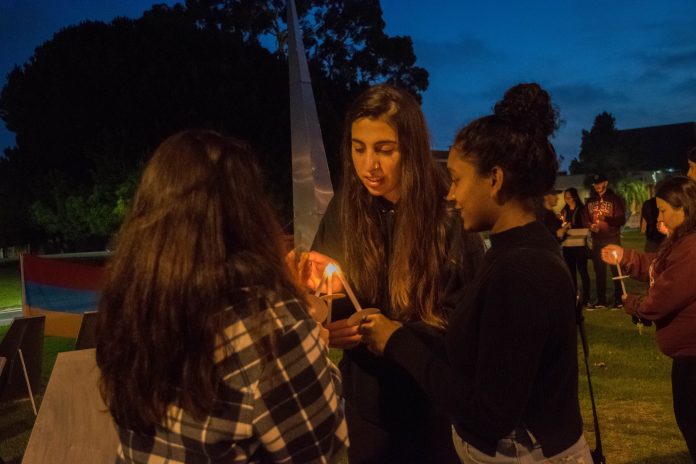
Lauren Marnel Shores
Campus Beat Reporter
On the 103rd anniversary of the Armenian Genocide, the Armenian Student Association (ASA) and Associated Students (A.S.) Senate recognized and commemorated what many have declared “the first genocide of the 20th century.”
The Armenian Genocide refers to the empire government’s mass deportation and killing of Armenian Christians in the Ottoman Empire between 1915 and 1916. The ruling party’s intolerance towards non-Turks resulted in the massacre of 1.5 million Armenians and the deportation of another half million Armenians. The Ottoman Empire was suspicious of potential coalition between Armenian subjects and foreign powers.
According to Encyclopedia Britannica, “by the end of the war, more than 90 percent of the Armenians in the Ottoman Empire were gone, and many traces of their former presence had been erased.”
To further commemorate the 103rd anniversary of the Armenian Genocide, ASA President Vanasis Ohanian and ASA Secretary Emmanuel Hartounian authored an A.S. Senate resolution with Transfer Senator Kian Maalizadeh and Off-Campus Senator Kristen Armellini. On Wednesday, Associated Students Senate unanimously passed the resolution as a statement of formal recognition for the Armenian Genocide.
Over the past week, the lawn in front of Storke Tower became the temporary home to a memorial for the genocide, placed there by Armenian Student Association. The metal structure is a replica of Tsitsernakaberd Memorial Complex which is the official memorial and pilgrimage site for Armenians to remember the 1.5 million lives lost during the beginning of World War I.
The replica tower stands at 25 feet tall and is encircled by 12 slabs that represent the “12 lost provinces” in present-day Turkey. In the center of the circle is an eternal flame dedicated to all of the lives lost in the massacre.
“Ou(r) wounds are st(i)ll o(p)en” reads a large banner in front of the memorial, written among images of a bloody handprint and a refugee mother carrying her two children.
The replica was the site of a candlelight vigil on Monday, April 23 and their Stain of Denial silent protest on Tuesday, April 24. ASA members Arthur Tarkhanyan, Sashur Kalashyan, and Hovhannes Khachatryan built the replica.
“To know that my fellow peers can understand and support my community is very heartwarming and makes me very excited for the future,” Hartounian said. “To have A.S. Senate’s support as well means a lot to our movement as well because they are issuing a statement from a world-renown[ed] university. Our voices get louder when we get more support from any institution.”
During Wednesday’s senate meeting, Armellini said she felt “humbled” to be a part of the resolution recognizing the Armenian genocide. “Acknowledging injustices is one of the first parts of moving forward towards the future, and the historical erasure of the Armenian Genocide by the Turkish government and the federal government is a big injustice,” Armellini said.
Although the Turkish government recognizes that atrocities did indeed occur against the Armenian people, they claim that the killings were not systematic. Therefore, the government believes it should not be considered a “genocide.” Regardless, the United Nations defines a genocide as any “acts committed with intent to destroy, in whole or in part, a national, ethnical, racial or religious group.”
Furthermore, Turkish Penal Code Article 301, which states that “a person who publicly degrades the military or security organisations shall be sentenced [to an imprisonment term for 6 months to 2 years],” has been used to criminalize individuals for making public statements acknowledging the genocide.
Only 26 countries have formally recognized the Armenian Genocide through adopted legislature as of 2017. In 2010, the United States House of Representatives’ foreign affairs committee voted 23-22 to officially label it a “genocide.” This vote was met with frustration by the Obama administration which was concerned about how it would affect relations with Turkey. Even still, only 48 states acknowledge the Armenian Genocide.
“Armenians are a very tight-knit culture and we have so much pride and respect for our motherland,” Hartounian said. “We all share this tragic event but we also share so many traditions, stories, and values. By uniting together we can confirm that Turkey failed.”










